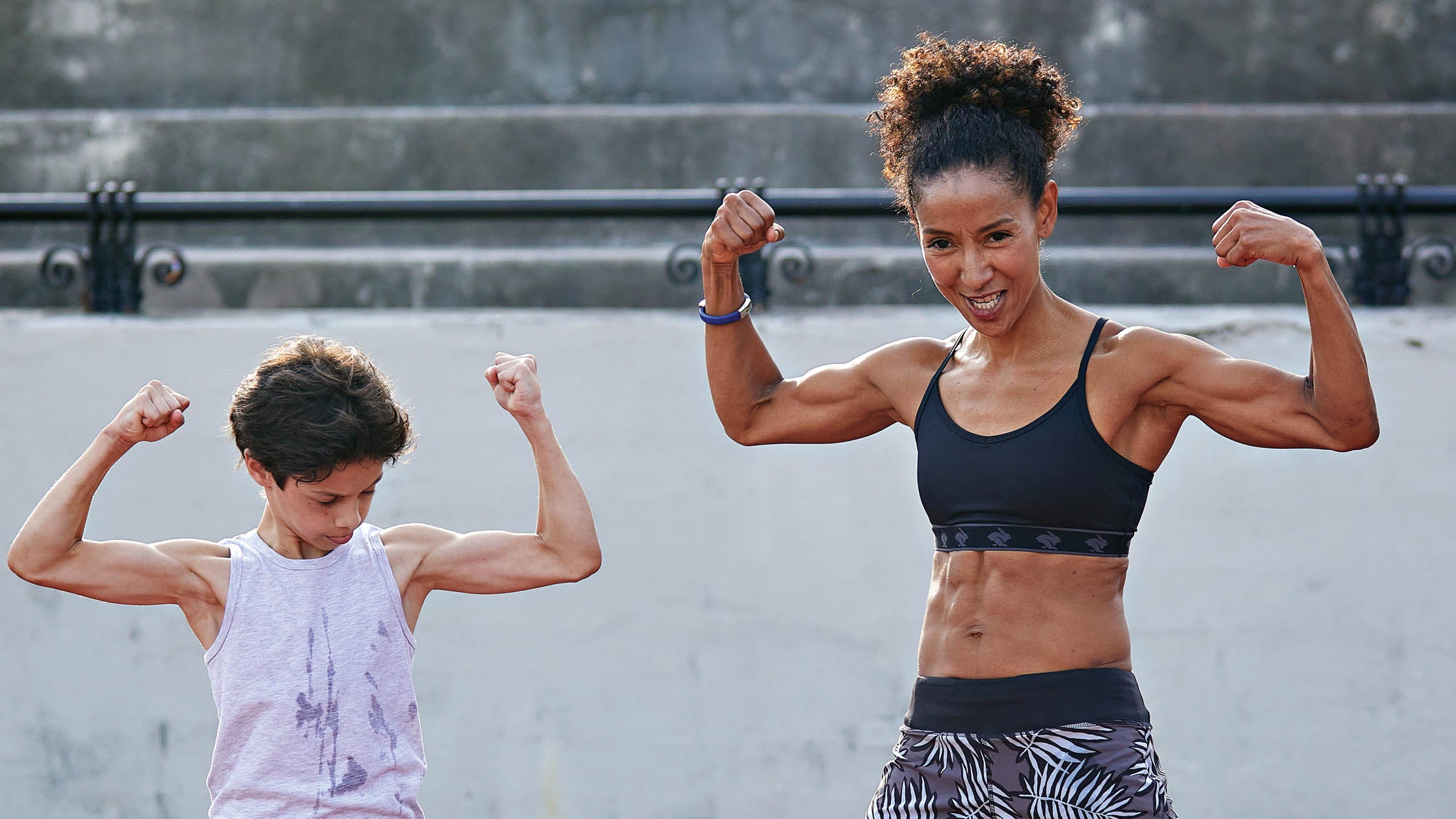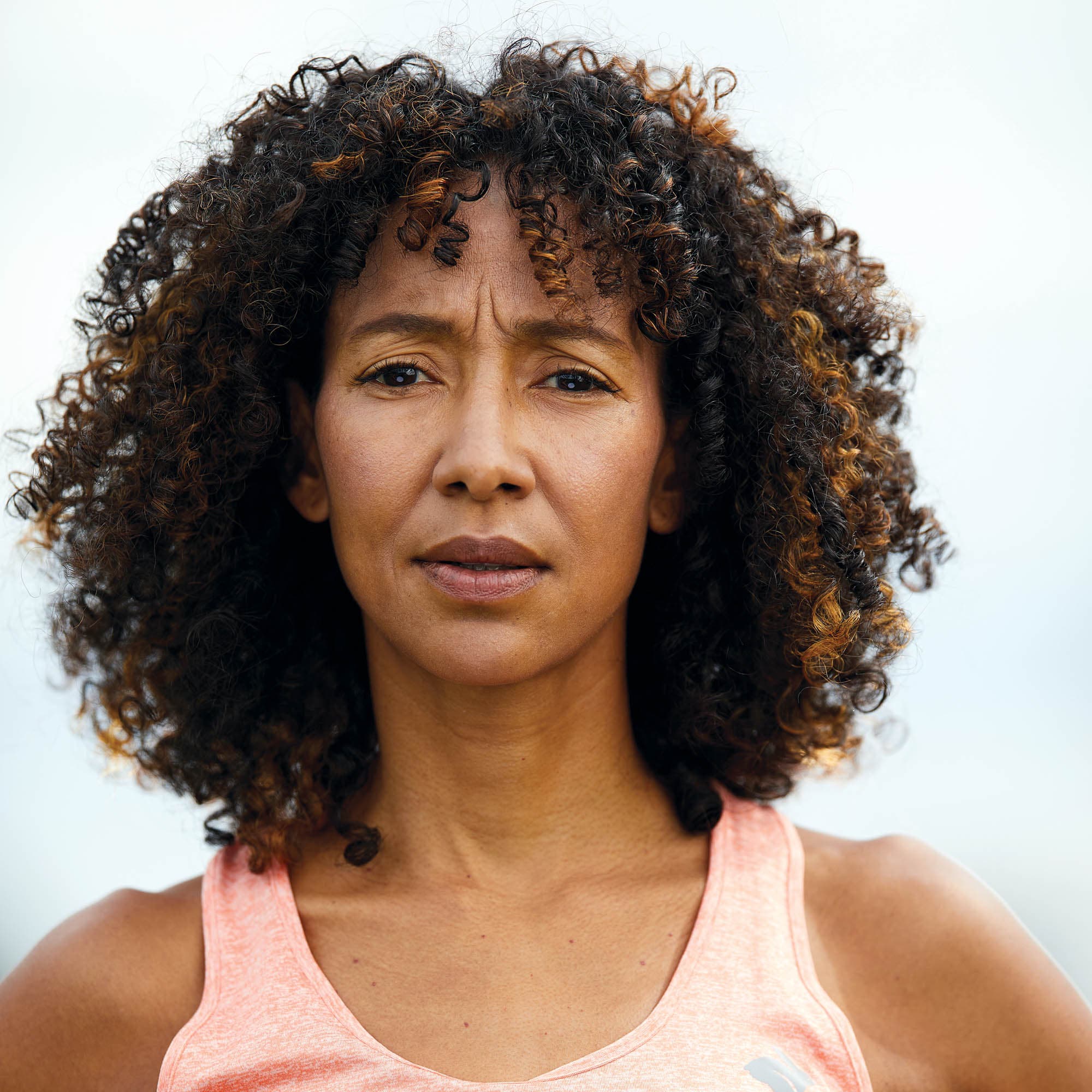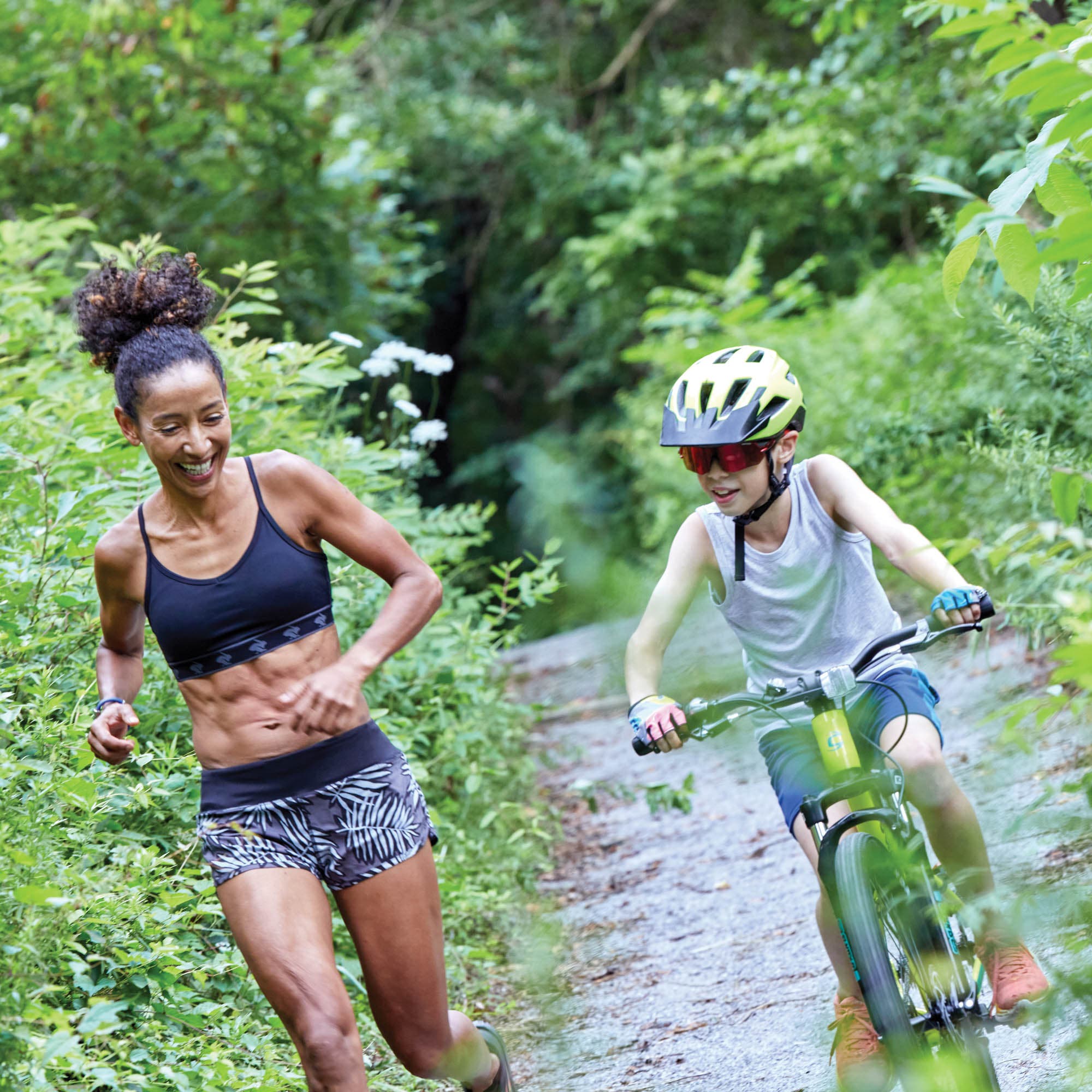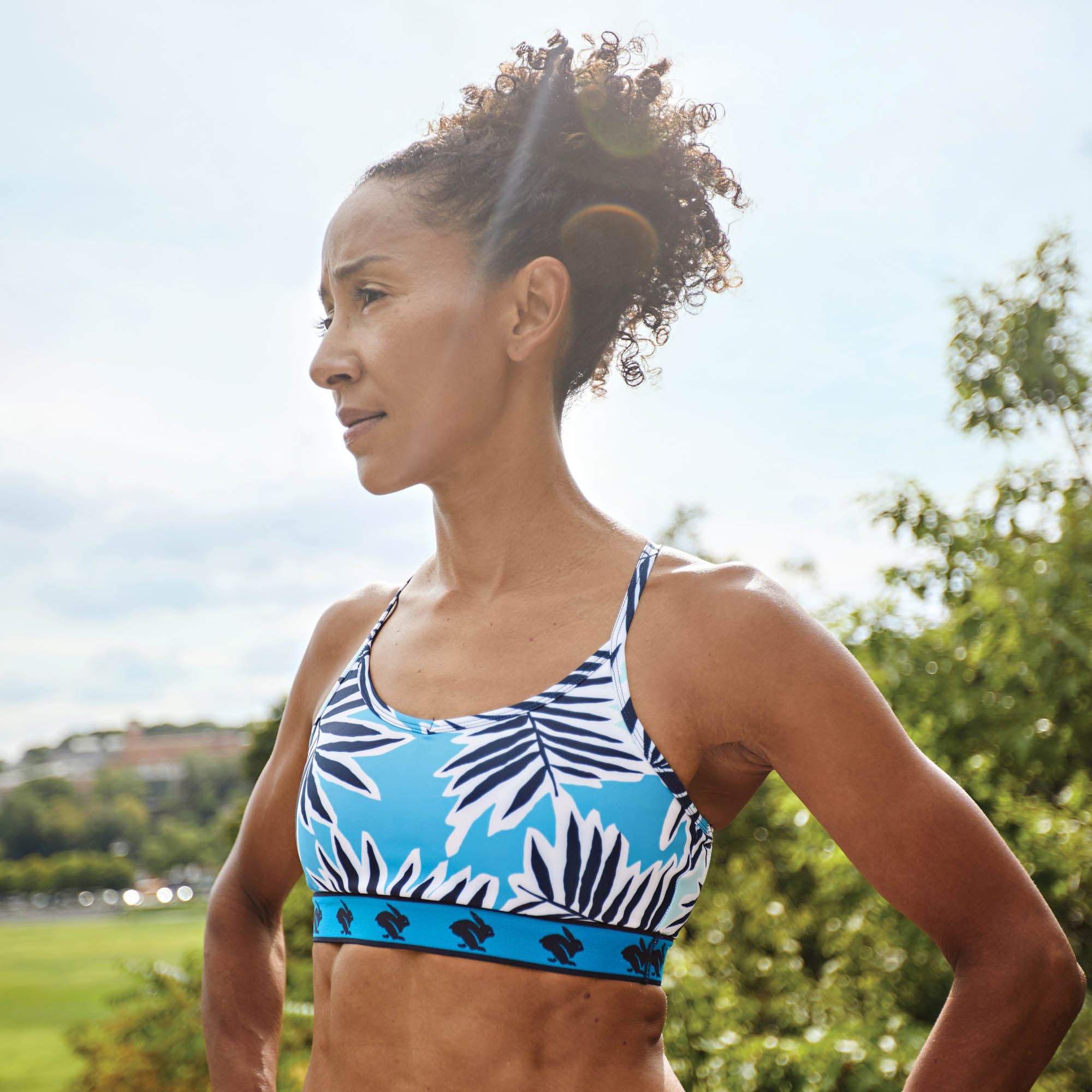From Outsider to Advocate: Meet Our 2021 Cover Contest Winner

(Photo: Danny Weiss)
“Nicole, you know the real reason you got into Amherst College, don’t you? Do you really think you deserve to be there?”
Thirty years later, these words still ring in the ears and sting in the heart of Nicole Sin Quee. A resentful and jealous high school friend, who hadn’t been accepted to Amherst, brought all of Sin Quee’s self-doubt and feelings of being an outsider to the forefront again. The Jamaican-born student-athlete had fought so hard for a spot at the table, but still she questioned herself: Did she deserve to be here? Did she get into this prestigious school for the “wrong” reasons? Who did she think she was?
It’s exactly because she doesn’t want other kids to face those same questions and doubts that she now works to create possibilities for her students and for young athletes who wouldn’t otherwise think of triathlon as open to them. That pay-it-forward attitude is why she was nominated for Triathlete’s Reader Cover Contest; her ability to overcome and set an example for others is why she won.
RELATED: Meet the 2021 Triathlete Reader Cover Contest Finalists
Sin Quee, now 49, was just eight years old when her parents decided to move from Kingston, Jamaica, to the United States. The goal was to be closer to family and to pursue greater opportunities and choices available, but Sin Quee, the youngest of six daughters born to Jamaican-Chinese parents, remembers confusion and a deep sense of loneliness instead.
The family was all set to move and then, at the last minute, her dad and four of her sisters stayed in Jamaica, but Nicole, her mom, and one sister still left for New Jersey. Taking the two youngest daughters, her parents agreed, would be the best transition—even if it wasn’t easy. “We lived with family friends until we could find a place of our own,” Sin Quee said. “My mom worked in a factory and then a nursing home doing double shifts and over-extending herself to provide for us.” She was determined not to return to Jamaica because, in her mom’s mind, it would’ve been seen as failure.
“I used to question this all the time in my loneliness. Why the heck did we leave a big house, a stable life, and family to come and suffer?” While her parents had big plans for the American Dream, she felt like the odd one out in her new home.
“I was the girl with the weird Jamaican accent and then I’d tell people I was also Chinese and they just wouldn’t get it,” she said. “They’d want to know: Are you black or are you white? And I didn’t know I had to choose.”
It was the first time—but it wasn’t the last—that people wanted to talk about race with Sin Quee. And it was the first time—but not the last—that she felt slighted and left on the outside.
“I am Sheila’s daughter,” she now says, a proud acknowledgement of her sturdy roots. “My mother always preached about commitment, and it’s why I’m so stubborn to this day. We made a commitment to come to the U.S. and, even when plans changed with my family, we honored that commitment, as difficult as it was.”

Her mom, she said, while loving and dedicated, also made it clear that there was no time for loneliness and sadness. “We have things to do,” she would say. Some might have seen this as cold or callous, but Sin Quee said her mom was quite the opposite. Actions meant everything to her—and so it was abundantly clear from an early age that, no matter what Nicole pursued in life, she must remain committed.
In addition to working two jobs, Sheila would also wake before dawn each morning to accompany her daughters on their paper route. She made most of their clothing herself and, together with family, would prepare daily meals from scratch. “My mother is stubborn, hard-working, and generous to a fault,” Nicole’s sister, Loraine, agreed. “She will defend her family like no other and has a smart mouth you don’t want to take on—all traits that Nicole has.”
Nicole was dedicated to her studies and smart, but she was stuck in a tough overcrowded school with plenty of fights. The teachers and counselors, she said, still gave so much of themselves, doing their best to look after the students and teach with enthusiasm. So, at the recommendation of one of those counselors, Nicole left home at the age of 13 to attend a boarding school—again a chance for greater opportunity if she could make it work.
Just like eight-year-old Nicole, 13-year-old Nicole once again felt the pang of sadness, loneliness, and exclusion in a new world surrounded by wealth and privilege. “I had never even had a sleepover before this,” she recalled. “I was one of about five students of color in my grade, and I didn’t have shared experiences in anything—not even music—so it’s not like I was hanging out singing with the other girls. I literally had nothing to share.”
Again, she felt completely out of place when it seemed normal to everyone else. As much as she wanted to come home, though, she honored her commitment. Her mom wouldn’t have it any other way—even if Nicole cried every week when she was dropped back off at school.
A dorm counselor was her guardian angel, letting Nicole come into her room when she felt too homesick. A cross-country coach was her savior too when, while she was on the way to field hockey tryouts, he shouted, “Hey Sin Quee, are you going to try out for cross-country today?”
She wasn’t intending on it, but ever the people-pleaser, she said yes. Suddenly, she was a runner. She never made it to field hockey try-outs.
It got better, as it does, but there were always moments where Nicole still felt left on the outside. She excelled at sports and academics—getting accepted to Amherst—but failed to win her high school’s student-athlete award. It went to another student. As an adult, she now knows the other girl deserved to win, but the gut-wrenching disappointment at the time of wanting something so badly and falling short remained with her for decades. Besides, it was the same time her supposed friend turned on her, telling her she didn’t really deserve to go to the prestigious college. It felt like maybe she wasn’t good enough after all.

See the Champion Inside
Looking back, so many of the slights seem trivial now—but still they gnaw. Everyone has those moments, those things they never forget. Nicole’s moments drove her to be better and then to bring others like her into worlds of privilege and opportunity, and ultimately into triathlon.
At Amherst, she discovered mountain biking and triathlon. She jokingly admits that she was an OK student, but a great mountain biker. She loved multisport and it showed in her results.
There was a triathlon back then where she won both the overall sprint and the relay. Typically, that would earn you the title of athlete of the week for the school—and a gift certificate to Bub’s Bar-B-Que. She had anxiously been waiting for that BBQ prize. But that year the gift certificate went to a tennis player. She doesn’t know why she didn’t win, but it added to the small slights and rejections.
“I would carry these rejections with me into adulthood and long past giving birth when the nurse told me to ‘push like you mean it,’ and I pushed so hard that I burst all the capillaries in my face,” she laughed. For Sin Quee, everything is a competition, everything is an opportunity to prove you’re good enough. “You thought I didn’t know how to push? Apparently, the only thing I don’t know how to do is to let things go.”
She did successfully graduate from Amherst College and went on to graduate school, and then to bringing others with her. Today, Nicole is a middle and high school math teacher and lives in the Bronx with her husband, Jonathan Cane (founder of City Coach Multisport), and their nine-year-old son, Simon.
She has also competed in five national and world championship races (duathlon, sprint, and long-course triathlon) and has placed top-three in her age group at each. She won the Duathlon National Championship (40-44 age group) in 2012, just six months after her son was born, and followed that up with a second-place finish at Duathlon Worlds in France later that year.
“Nicole is incredibly intense and driven, but she is not just a one-dimensional athlete,” Cane said, who not only coaches his wife but also nominated her for the Reader Cover Contest. “People may only see one side of her, but she’s so multifaceted and does it all so well, which is one of the reasons she is so deserving of this honor.”
In true coaching form, he also provides the perspective Nicole needs in times of self-doubt or nervousness. “See yourself the way others see you,” he tells her. And how do others see her? As a champion at everything she does.
In 2010, Nicole was racing the New York Road Runners sprint triathlon as the defending champion. She wanted to win, but she also races so intensely because she constantly feels the need to prove she is good enough, deserving enough.
That day, the chip on her shoulder became a chip in her shoulder when she took a turn too aggressively on the bike and went down hard. But, in the spirit she was raised to display, Nicole got back on her bike, finished the race, and won with a cushion of three minutes.

Outsider to Advocate
Today, she wants other kids—kids who felt like she did—to believe they belong and that they deserve to be here too (without having to crash or endure endless slights along the way). She wants them to see themselves as champions. Understanding from personal experience that kids of color are not well-represented in the sport, Nicole, along with Cane, have started triathlon camps for middle- and high-schoolers to help grow minority participation.
Their theme for these camps? If you want to know what a triathlete looks like, look in the mirror.
RELATED: Why Aren’t There More Black Triathletes?
“It is exciting to see the transformation over a week,” Cane said. “And, having Nicole there as a national champion athlete, math teacher, and mom is so inspiring to these kids who could never imagine that there may be a place for them in the sport.” They’ve also brought in guest speakers to help widen the kids’ perspectives, including Roderick Sewell, the first bilateral above-the-knee amputee to finish the Ironman World Championship.
“By the end of the course, we had more eye contact from all our athletes. They were speaking louder, showing more confidence, laughing, and even trying to outdo some of our expectations,” Nicole said. “One athlete, who was initially so quiet and reserved, ran with me and, at the end, sprinted in and left me for dead.” This young girl’s parents wrote them a note after the camp that said not only had her daughter’s physical fitness and overall awareness of her abilities improved, but “I hope she brings that experience with her to the classroom and puts that in her memory bank so that she gives herself room to be better.”
It can be so easy to see triathlon or cycling as a sport where you don’t belong, or where everyone else besides you got the memo. Making it more inclusive is what fuels Nicole and her family these days. She races as a proud ambassador for the BIPOC (Black, Indigenous, and People of Color) community. Not only is she back to triathlon after a long hiatus, but she is also making a grand entrance into the world of gravel racing and cyclocross as part of Randy Locklair’s BE Cyclocross team, a program he started to get more black and brown athletes on bikes. And she’s part of the Ride for Racial Justice nonprofit organization, which aims to provide resources and education for BIPOC cyclists and dismantle systemic racism so that everyone can feel empowered and safe while riding a bike.
One of the things that got her racing again was the fact that her son, Simon, is now old enough to watch and understand. The last time she raced a world championship, he was too little and had no idea what was going on. “It’s one thing for me to tell him that his mom is a badass. It’s another thing for him to witness it,” Cane said.
He’ll witness it, along with so many others whose lives Nicole touches. As she shares her own personal stories of struggle with her athletes and students, she also stresses that, “The path to success isn’t always the way other people define it. You get to decide for yourself what success looks like.”
A few years ago, she appeared in an ad for Dick’s Sporting Goods where she looked into the camera and told viewers, “I want my son, Simon, to know that his mother got it done…That it is in his genetic makeup to be a champion at whatever he chooses to be.”
And she did get it done. The path may have had some unexpected left turns and naysayers along the way, but that’s helped forge her uniquely iron character. She’s gone from afterthought to ambassador, from outsider to fierce advocate, pulling up chairs to help those like her, those who feel like they would never otherwise even get a seat at the table.
This year we ask you to nominate the amazing triathletes giving back and helping to grow our sport in underserved communities. We narrowed the nominations down and then asked you to vote. Check out the other amazing finalists and see Sin Quee on the cover of our Sept/Oct issue out right now.